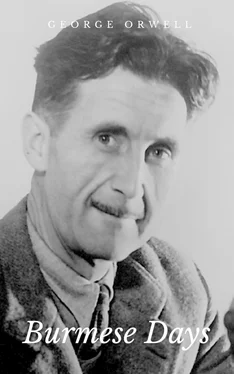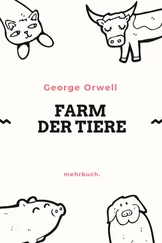When Flory had done with her he turned away, jaded and ashamed, and lay silent with his left hand covering his birthmark. He always remembered the birthmark when he had done something to be ashamed of. He buried his face disgustedly in the pillow, which was damp and smelt of coco-nut oil. It was horribly hot, and the doves outside were still droning. Ma Hla May, naked, reclined beside Flory, fanning him gently with a wicker fan she had taken from the table.
Presently she got up and dressed herself, and lighted a cigarette. Then, coming back to the bed, she sat down and began stroking Flory’s bare shoulder. The whiteness of his skin had a fascination for her, because of its strangeness and the sense of power it gave her. But Flory twitched his shoulder to shake her hand away. At these times she was nauseating and dreadful to him. His sole wish was to get her out of his sight.
‘Get out,’ he said.
Ma Hla May took her cigarette from her mouth and tried to offer it to Flory. ‘Why is master always so angry with me when he has made love to me?’ she said.
‘Get out,’ he repeated.
Ma Hla May continued to stroke Flory’s shoulder. She had never learned the wisdom of leaving him alone at these times. She believed that lechery was a form of witchcraft, giving a woman magical powers over a man, until in the end she could weaken him to a half-idiotic slave. Each successive embrace sapped Flory’s will and made the spell stronger—this was her belief. She began tormenting him to begin over again. She laid down her cigarette and put her arms round him, trying to turn him towards her and kiss his averted face, reproaching him for his coldness.
‘Go away, go away!’ he said angrily. ‘Look in the pocket of my shorts. There is money there. Take five rupees and go.’
Ma Hla May found the five-rupee note and stuffed it into the bosom of her ingyi, but she still would not go. She hovered about the bed, worrying Flory until at last he grew angry and jumped up.
‘Get out of this room! I told you to go. I don’t want you in here after I’ve done with you.’
‘That is a nice way to speak to me! You treat me as though I were a prostitute.’
‘So you are. Out you go,’ he said, pushing her out of the room by her shoulders. He kicked her sandals after her. Their encounters often ended in this way.
Flory stood in the middle of the room, yawning. Should he go down to the Club for tennis after all? No, it meant shaving, and he could not face the effort of shaving until he had a few drinks inside him. He felt his scrubby chin and lounged across to the mirror to examine it, but then turned away. He did not want to see the yellow, sunken face that would look back at him. For several minutes he stood, slack-limbed, watching the tuktoo stalk a moth above the bookshelves. The cigarette that Ma Hla May had dropped burned down with an acrid smell, browning the paper. Flory took a book from the shelves, opened it and then threw it away in distaste. He had not even the energy to read. Oh God, God, what to do with the rest of this bloody evening?
Flo waddled into the room, wagging her tail and asking to be taken for a walk. Flory went sulkily into the little stone-floored bathroom that gave on the bedroom, splashed himself with lukewarm water and put on his shirt and shorts. He must take some kind of exercise before the sun went down. In India it is in some way evil to spend a day without being once in a muck-sweat. It gives one a deeper sense of sin than a thousand lecheries. In the dark evening, after a quite idle day, one’s ennui reaches a pitch that is frantic, suicidal. Work, prayer, books, drinking, talking—they are all powerless against it; it can only be sweated out through the pores of the skin.
Flory went out and followed the road uphill into the jungle. It was scrub jungle at first, with dense stunted bushes, and the only trees were half-wild mangoes, bearing little turpentiny fruits the size of plums. Then the road struck among taller trees. The jungle was dried-up and lifeless at this time of year. The trees lined the road in close, dusty ranks, with leaves a dull olive-green. No birds were visible except some ragged brown creatures like disreputable thrushes, which hopped clumsily under the bushes; in the distance some other bird uttered a cry of ‘Ah ha ha! Ah ha ha!’—a lonely, hollow sound like the echo of a laugh. There was a poisonous, ivy-like smell of crushed leaves. It was still hot, though the sun was losing his glare and the slanting light was yellow.
After two miles the road ended at the ford of a shallow stream. The jungle grew greener here, because of the water, and the trees were taller. At the edge of the stream there was a huge dead pyinkado tree festooned with spidery orchids, and there were some wild lime bushes with white, waxen flowers. They had a sharp scent like bergamot. Flory had walked fast and the sweat had drenched his shirt and dribbled, stinging, into his eyes. He had sweated himself into a better mood. Also, the sight of this stream always heartened him; its water was quite clear, rarest of sights in a miry country. He crossed the stream by the stepping stones, Flo splashing after him, and turned into a narrow track he knew, which led through the bushes. It was a track that cattle had made, coming to the stream to drink, and few human beings ever followed it. It led to a pool fifty yards up-stream. Here a peepul tree grew, a great buttressed thing six feet thick, woven of innumerable strands of wood, like a wooden cable twisted by a giant. The roots of the tree made a natural cavern, under which the clear greenish water bubbled. Above and all round dense foliage shut out the light, turning the place into a green grotto walled with leaves.
Flory threw off his clothes and stepped into the water. It was a shade cooler than the air, and it came up to his neck when he sat down. Shoals of silvery mahseer, no bigger than sardines, came nosing and nibbling at his body. Flo had also flopped into the water, and she swam round silently, otterlike, with her webbed feet. She knew the pool well, for they often came here when Flory was at Kyauktada.
There was a stirring high up in the peepul tree, and a bubbling noise like pots boiling. A flock of green pigeons were up there, eating the berries. Flory gazed up into the great green dome of the tree, trying to distinguish the birds; they were invisible, they matched the leaves so perfectly, and yet the whole tree was alive with them, shimmering, as though the ghosts of birds were shaking it. Flo rested herself against the roots and growled up at the invisible creatures. Then a single green pigeon fluttered down and perched on a lower branch. It did not know that it was being watched. It was a tender thing, smaller than a tame dove, with jade-green back as smooth as velvet, and neck and breast of iridescent colours. Its legs were like the pink wax that dentists use.
The pigeon rocked itself backwards and forwards on the bough, swelling out its breast-feathers and laying its coralline beak upon them. A pang went through Flory. Alone, alone, the bitterness of being alone! So often like this, in lonely places in the forest, he would come upon something—bird, flower, tree—beautiful beyond all words, if there had been a soul with whom to share it. Beauty is meaningless until it is shared. If he had one person, just one, to halve his loneliness! Suddenly the pigeon saw the man and dog below, sprang into the air and dashed away swift as a bullet, with a rattle of wings. One does not often see green pigeons so closely when they are alive. They are high-flying birds, living in the treetops, and they do not come to the ground, or only to drink. When one shoots them, if they are not killed outright, they cling to the branch until they die, and drop long after one has given up waiting and gone away.
Читать дальше











